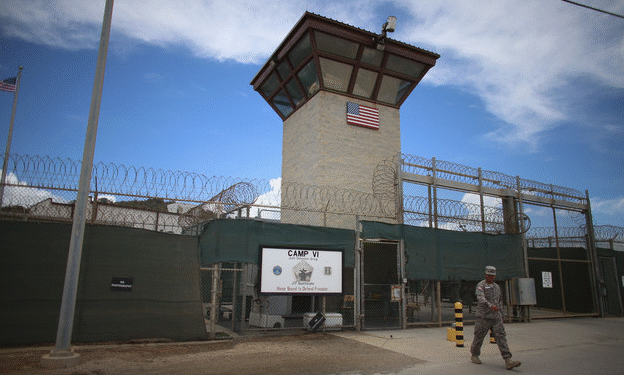The Trump administration is set to sharply increase the number of undocumented migrants sent to Guantanamo Bay this week, with at least 9,000 individuals currently undergoing vetting for transfer, according to documents obtained by POLITICO.
This marks a massive jump from the roughly 500 migrants temporarily held at the facility since February, and moves the administration closer to President Donald Trump’s January pledge to house up to 30,000 migrants there.
Transfers could begin as early as Wednesday. The documents indicate the detainees would stay at the facility briefly before being deported.
Officials say the move aims to free up bed space in U.S.-based detention centers. However, using a site long associated with terrorism suspects sends a clear deterrent message to those considering illegal entry into the country.
The plan came together over just a few days and remains subject to change. Homeland Security may not notify the migrants’ home countries ahead of time, the documents note.
Spokespeople for DHS and the State Department did not respond to requests for comment.
The White House has been urging Immigration and Customs Enforcement to boost arrest numbers, with senior adviser Stephen Miller pushing for 3,000 arrests. ICE is struggling with limited detention space and seeking more funding from Congress to hire agents and expand facilities.
One document shows that around 800 Europeans—including an Austrian, 100 Romanians, and 170 Russians—are among those being considered for transfer. That part of the plan has unsettled some U.S. diplomats, who argue these countries typically cooperate on deportations, making Guantanamo unnecessary.
State Department officials handling European affairs are urging DHS to reconsider.
“The message is to shock and horrify people, to upset people,” said a State Department official familiar with the issue. “But we’re allies.” The official spoke anonymously, not being authorized to speak publicly.
Legal battles are also heating up to stop the use of Guantanamo for housing migrants. A federal class-action lawsuit in Washington says about 70 immigrants are currently held under “punitive” conditions, with limited food, weekly clothing changes, and rodent issues.
“The government has identified no legitimate purpose that is served by holding immigrant detainees at Guantanamo, rather than at detention facilities inside the United States,” ACLU attorneys argue. “Instead, defendants are using the threat of detention at Guantanamo to frighten immigrants, deter future migration, induce self-deportation, and coerce people in detention to give up claims against removal and accept deportation elsewhere.”
U.S. District Judge Carl Nichols, a Trump appointee, is overseeing the case.
Guantanamo has traditionally held terrorism suspects captured after the 9/11 attacks. Recently, the Trump administration has used it to detain migrants facing deportation, even though it sits on Cuban soil.
It’s unclear how long new detainees would stay before being sent back to their home countries.
Since February, the facility has held about 500 migrants, according to a recent court filing. Sen. Gary Peters, the top Democrat on the Senate Homeland Security and Governmental Affairs Committee, said last month it costs about $100,000 per detainee per day to operate the facility.
During the height of the war on terror, Guantanamo held 780 detainees. Pentagon officials expressed concern in January when Trump ordered the facility to house up to 30,000 migrants. They cited issues like tropical weather, limited staffing, poor medical access, and broader logistical challenges of using the military to support border enforcement.
The U.S. has leased the 45-square-mile naval base since 1903. In February, it held 178 migrants before the administration abruptly moved Venezuelan detainees out. In a Feb. 20 court filing, the administration said Guantanamo would only be used for temporary detention.
“The removal also underscores that immigration detention at [Guantanamo Bay] is intended for temporary staging and not for indefinite detention, as Petitioners have suggested in their filings,” Justice Department lawyers said.









